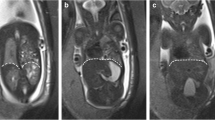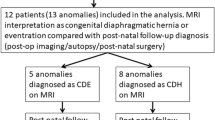Abstract
Objectives
To investigate developmental changes in the apparently unaffected contralateral lung by using signal intensity ratios (SIR) and lung volumes (LV), and to search for correlation with clinical outcome.
Methods
Twenty-five fetuses (22–37 weeks’ gestation) were examined. Lung/liver signal intensity ratios (LLSIR) were assessed on T1-weighted and T2-weighted sequences for both lungs, then together with LV compared with age-matched controls of 91 fetuses by using the U test. Differences in LLSIRs and lung volumes were correlated with neonatal outcomes.
Results
LLSIRs in fetuses with congenital diaphragmatic hernia (CDH) were significantly higher in both lungs on T1-weighted images and significantly lower on T2-weighted images, compared with normals (p < 0.05), increasing on T2-weighted imaging and decreasing on T1-weighted imaging during gestation. Total LV were significantly smaller in the CDH group than in controls (p < 0.05). No significant differences in LLSIR of the two lungs were found. Outcomes correlated significantly with total LV, but not with LLSIR.
Conclusion
Changes in LLSIR seem to reflect developmental impairment in CDH; however, they provide no additional information in predicting outcome. LV remains the best indicator on fetal MR imaging of neonatal survival in isolated, left-sided CDH.





Similar content being viewed by others
References
Harrison MR, Adzik NS, Estes JM, Howell LJ (1994) A prospective study of the outcome for fetuses with diaphragmatic hernia. JAMA 271:382–384
Langham MR Jr, Kays DW, Ledbetter DJ, Frentzen B, Sanford LL, Richards DS (1996) Congenital diaphragmatic hernia. Epidemiology and outcome. Clin Perinatol 23:671–688
Gucciardo L, Deprest J, Done’ E et al (2008) Prediction of outcome in isolated congenital diaphragmatic hernia and its consequences for fetal therapy. Best Pract Res Clin Obstet Gynaecol 22:123–138
Doné E, Gucciardo L, Van Mieghem T et al (2008) Prenatal diagnosis, prediction of outcome and in utero therapy of isolated congenital diaphragmatic hernia. Prenat Diagn 28:581–591
Jani J, Cannie M, Done E et al (2007) Relationship between lung area at ultrasound examination and lung volume assessment with magnetic resonance imaging in isolated congenital diaphragmatic hernia. Ultrasound Obstet Gynecol 30:855–860
Jani JC, Cannie M, Peralta CF, Deprest JA, Nicolaides KH, Dymarkowski S (2007) Lung volumes in fetuses with congenital diaphragmatic hernia: comparison of 3D US and MR imaging assessments. Radiology 244:575–582
Neff KW, Kilian AK, Schaible T, Schütz EM, Büsing KA (2007) Prediction of mortality and need for neonatal extracorporeal membrane oxygenation in fetuses with congenital diaphragmatic hernia: logistic regression analysis based on MRI fetal lung volume measurements. AJR Am J Roentgenol 189:1307–1311
Kilian AK, Schaible T, Hofmann V, Brade J, Neff KW, Büsing KA (2009) Congenital diaphragmatic hernia: predictive value of MRI relative lung-to-head ratio compared with MRI fetal lung volume and sonographic lung-to-head ratio. AJR Am J Roentgenol 192:153–158
Tanigaki S, Miyakoshi K, Tanaka M et al (2004) Pulmonary hypoplasia: prediction with use of ratio of MR imaging-measured fetal lung volume to US-estimated fetal body weight. Radiology 232:767–772
Mahieu-Caputo D, Sonigo P, Dommergues M et al (2001) Fetal lung volume measurement by magnetic resonance imaging in congenital diaphragmatic hernia. BJOG 108:863–868
Balassy C, Kasprian G, Brugger PC et al (2007) MRI investigation of normal fetal lung maturation using signal intensities on different imaging sequences. Eur Radiol 17:835–842
Balassy C, Kasprian G, Brugger PC et al (2008) Diffusion-weighted MR imaging of the normal fetal lung. Eur Radiol 18:700–706
Brewerton LJ, Chari RS, Liang Y, Bhargava R (2005) Fetal lung-to-liver signal intensity ratio at MR imaging: development of a normal scale and possible role in predicting pulmonary hypoplasia in utero. Radiology 235:1005–1010
Keller TM, Rake A, Michel SC, Seifert B, Wisser J, Marincek B, Kubik-Huch RA (2004) MR assessment of fetal lung development using lung volumes and signal intensities. Eur Radiol 14:984–989
Nakamura Y, Yamamoto I, Fukuda S, Hashimoto T (1991) Pulmonary acinar development in diaphragmatic hernia. Arch Pathol Lab Med 115:372–376
George DK, Cooney TP, Chiu BK, Thurlbeck WM (1987) Hypoplasia and immaturity of the terminal lung unit (acinus) in congenital diaphragmatic hernia. Am Rev Respir Dis 136:947–950
Kuwashima S, Nishimura G, Iimura F, Kohno T, Watanabe H, Kohno A, Fujioka M (2001) Low-intensity fetal lungs on MRI may suggest the diagnosis of pulmonary hypoplasia. Pediatr Radiol 31:669–672
Levine D, Barnewolt CE, Mehta TS, Trop I, Estroff J, Wong G (2003) Fetal thoracic abnormalities: MR imaging. Radiology 228:379–388
Osada H, Kaku K, Masuda K, Iitsuka Y, Seki K, Sekiya S (2004) Quantitative and qualitative evaluations of fetal lung with MR imaging. Radiology 231:887–892
Matsushita M, Ishii K, Tamura M, Takahashi Y, Kamura T, Takakuwa K, Tanaka K (2008) Perinatal magnetic resonance fetal lung volumetry and fetal lung-to-liver signal intensity ratio for predicting short outcome in isolated congenital diaphragmatic hernia and cystic adenomatoid malformation of the lung. J Obstet Gynaecol Res 34:162–167
Kasprian G, Balassy C, Brugger PC, Prayer D (2006) MRI of normal and pathological fetal lung development. Eur J Radiol 57:261–270
Jani J, Cannie M, Sonigo P (2008) Value of prenatal magnetic resonance imaging in the prediction of postnatal outcome in fetuses with diaphragmatic hernia. Ultrasound Obstet Gynecol 32:793–799
Cannie M, Jani J, Meersschaert J et al (2008) Prenatal prediction of survival in isolated diaphragmatic hernia using observed to expected total fetal lung volume determined by magnetic resonance imaging based on either gestational age or fetal body volume. Ultrasound Obstet Gynecol 32:633–639
Cannie MM, Jani JC, Van Kerkhove F et al (2008) Fetal body volume at MR imaging to quantify total fetal lung volume: normal ranges. Radiology 247:197–203
Stege G, Fenton A, Jaffray B (2003) Nihilism in the 1990s: the true mortality of congenital diaphragmatic hernia. Pediatrics 112:532–535
Colvin J, Bower C, Dickinson JE, Sokol J (2005) Outcomes of congenital diaphragmatic hernia: a population-based study in Western Australia. Pediatrics 116:e356–e363
Askenazi SS, Perlman M (1979) Pulmonary hypoplasia: lung weight and radial alveolar count as criteria of diagnosis. Arch Dis Child 54:614–618
Emery JL, Mithal A (1960) The number of alveoli in the terminal respiratory unit of man during late intrauterine life and childhood. Arch Dis Child 35:544–547
Reale FR, Esterly JR (1973) Pulmonary hypoplasia: a morphometric study of the lungs of infants with diaphragmatic hernia, anencephaly, and renal malformations. Pediatrics 51:91–96
Kitagawa M, Hislop A, Boyden EA, Reid L (1971) Lung hypoplasia in congenital diaphragmatic hernia. A quantitative study of airway, artery, and alveolar development. Br J Surg 58:342–346
Areechon W, Eid L (1963) Hypoplasia of lung with congenital diaphragmatic hernia. Br Med J 1:230–233
Ting A, Glick PL, Wilcox DT, Holm BA, Gil J, DiMaio M (1998) Alveolar vascularization of the lung in a lamb model of congenital diaphragmatic hernia. Am J Respir Crit Care Med 157:31–34
Naeye RL, Shochat SJ, Whitman V, Maisels MJ (1976) Unsuspected pulmonary vascular abnormalities associated with diaphragmatic hernia. Pediatrics 58:902–906
O’Toole SJ, Irish MS, Holm BA, Glick PL (1996) Pulmonary vascular abnormalities in congenital diaphragmatic hernia. Clin Perinatol 23:781–794
Hassett MJ, Glick PL, Karamanoukian HL, Rossman JE, Wilcox DT, Azizkhan RG (1995) Pathophysiology of congenital diaphragmatic hernia. XVI: Elevated pulmonary collagen in the lamb model of congenital diaphragmatic hernia. J Pediatr Surg 30:1191–1194
Wigglesworth JS, Desai R, Guerrini P (1981) Fetal lung hypoplasia: biochemical and structural variations and their possible significance. Arch Dis Child 56:606–615
Sullivan KM, Hawgood S, Flake AW, Harrison MR, Adzick NS (1994) Amniotic fluid phospholipid analysis in the fetus with congenital diaphragmatic hernia. J Pediatr Surg 29:1020–1023
Hisanaga S, Shimokawa H, Kashiwabara Y, Maesato S, Nakano H (1984) Unexpectedly low lecithin/sphingomyelin ratio associated with fetal diaphragmatic hernia. Am J Obstet Gynecol 149:905–906
IJsselstijn H, Zimmermann LJ, Bunt JE, de Jongste JC, Tibboel D (1998) Prospective evaluation of surfactant composition in bronchoalveolar lavage fluid of infants with congenital diaphragmatic hernia and of age-matched controls. Crit Care Med 26:573–580
Boucherat O, Benachi A, Chailley-Heu B, Franco-Montoya ML, Elie C, Martinovic J, Bourbon JR (2007) Surfactant maturation is not delayed in human fetuses with diaphragmatic hernia. PLoS Med 31(4):e237
Witters I, Legius E, Moerman P, Deprest J, Van Schoubroeck D, Timmerman D, Van Assche FA, Fryns JP (2001) Associated malformations and chromosomal anomalies in 42 cases of prenatally diagnosed diaphragmatic hernia. Am J Med Genet 103:278–282
Fauza DO, Wilson JM (1994) Congenital diaphragmatic hernia and associated anomalies: their incidence, identification, and impact on prognosis. J Pediatr Surg 29:1113–1117
Albanese CT, Lopoo J, Goldstein RB, Filly RA, Feldstein VA, Calen PW, Jennings RW, Farrell JA, Harrison MR (1998) Fetal liver position and perinatal outcome for congenital diaphragmatic hernia. Prenat Diagn 18:1138–1142
Cannie M, Jani J, Chaffiotte C, Vaast P, Deruelle P, Houfflin-Debarge V, Dymarkowski S, Deprest J (2008) Quantification of intrathoracic liver herniation by magnetic resonance imaging and prediction of postnatal survival in fetuses with congenital diaphragmatic hernia. Ultrasound Obstet Gynecol 32:627–632
Worley KC, Dashe JS, Barber RG, Megison SM, McIntire DD, Twickler DM (2009) Fetal magnetic resonance imaging in isolated diaphragmatic hernia: volume of herniated liver and neonatal outcome. Am J Obstet Gynecol 200(3):318.e1–318.e6. doi:10.1016/j.ajog.2008.10.008
Coakley FV, Lopoo JB, Lu Y, Hricak H, Albanese CT, Harrison MR, Filly RA (2000) Normal and hypoplastic fetal lungs: volumetric assessment with prenatal single-shot rapid acquisition with relaxation enhancement MR imaging. Radiology 216:107–111
Paek BW, Coakley FV, Lu Y et al (2001) Congenital diaphragmatic hernia: prenatal evaluation with MR lung volumetry—preliminary experience. Radiology 220:63–67
Author information
Authors and Affiliations
Corresponding author
Rights and permissions
About this article
Cite this article
Balassy, C., Kasprian, G., Brugger, P.C. et al. Assessment of lung development in isolated congenital diaphragmatic hernia using signal intensity ratios on fetal MR imaging. Eur Radiol 20, 829–837 (2010). https://doi.org/10.1007/s00330-009-1633-x
Received:
Revised:
Accepted:
Published:
Issue Date:
DOI: https://doi.org/10.1007/s00330-009-1633-x




